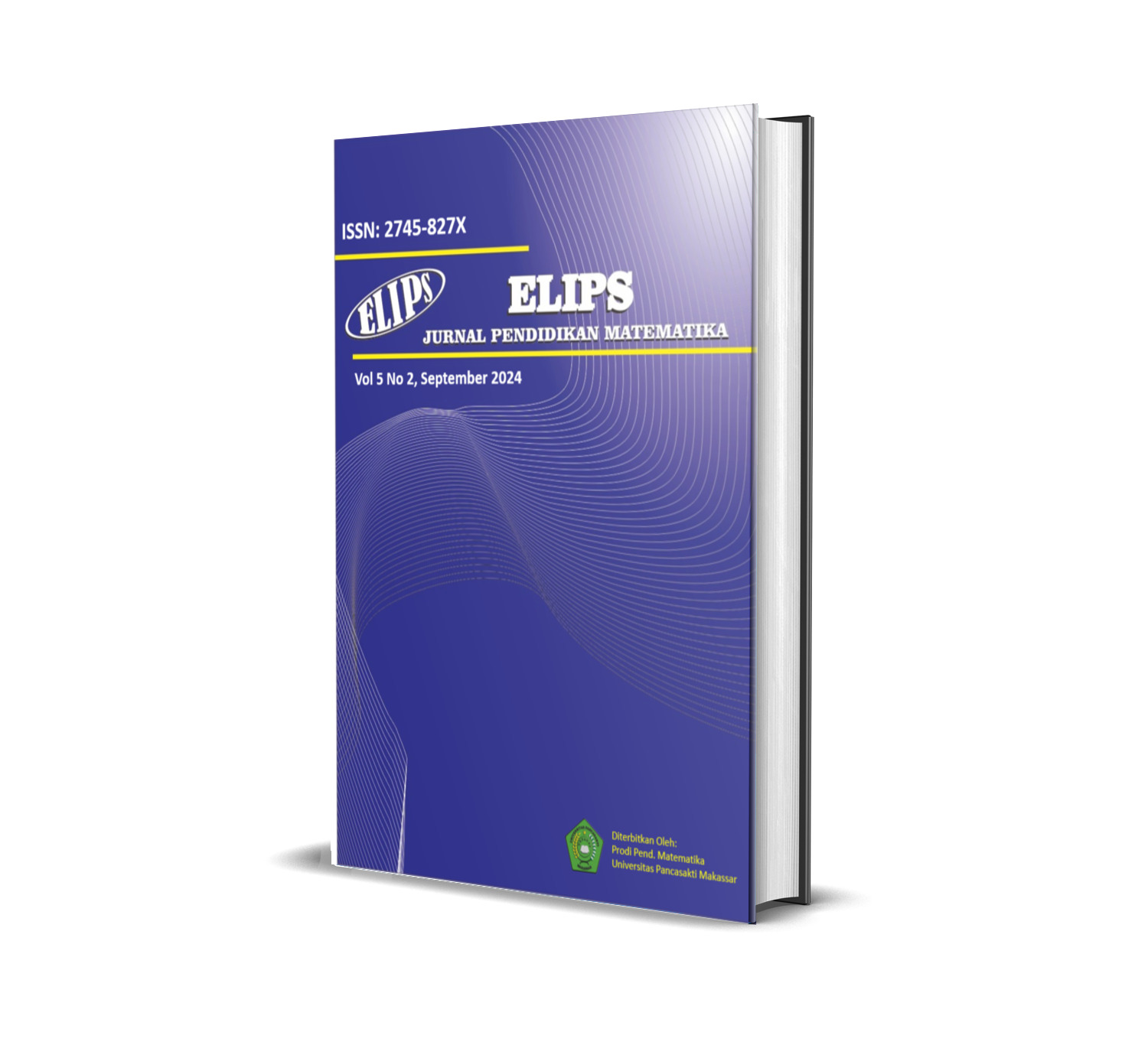MENGUNGKAP EFEKTIVITAS PERMAINAN MATEMATIKA INSTRUKSIONAL DALAM MENINGKATKAN MOTIVASI INTRINSIK DAN PRESTASI BELAJAR SISWA
Abstract
Artikel ini membahas tentang eksplorasi model permainan matematika instruksional dalam meningkatkan motivasi intrinsik dan prestasi belajar siswa. Penelitian ini bertujuan untuk mengungkap efektivitas permainan matematika instruksional (PMI) dalam meningkatkan motivasi intrinsik dan prestasi belajar siswa. Metode yang digunakan dalam penelitian ini adalah tinjauan literatur sistematis dengan pendekatan Preferred Reporting Items for Systematic Review and Meta-Analyses (PRISMA). Proses identifikasi dan seleksi dilakukan terhadap artikel-artikel yang relevan dari database Crossref, dengan fokus pada kata kunci seperti efektivitas, permainan matematika instruksional, motivasi intrinsik, dan prestasi belajar. Hasil penelitian menunjukkan bahwa penerapan PMI secara signifikan meningkatkan motivasi intrinsik siswa, yang tercermin dari peningkatan minat, keterlibatan, dan keinginan siswa untuk belajar matematika. Selain itu, PMI juga berkontribusi positif terhadap prestasi belajar siswa, dengan peningkatan yang signifikan dalam pemahaman konsep dan kemampuan pemecahan masalah matematika. Namun, penelitian ini juga mengidentifikasi beberapa tantangan dalam penerapan PMI, termasuk kurangnya pemahaman guru tentang desain permainan yang efektif dan keterbatasan sumber daya. Kesimpulan dari penelitian ini menegaskan bahwa PMI memiliki potensi besar untuk meningkatkan motivasi dan prestasi belajar siswa, namun diperlukan upaya komprehensif dalam pelatihan guru dan penyediaan sumber daya yang memadai.
References
Sardiman, A. M. 2018, ”Interaksi & Motivasi Belajar Mengajar.” Jakarta: Rajawali Pers.
Ryan, R. M., & Deci, E. L. 2020, “Intrinsic and Extrinsic Motivations: Classic Definitions and New Directions.” Contemporary Educational Psychology, 25(1), 54-67.
Banfield, J., & Wilkerson, B. 2022, “Increasing student intrinsic motivation and self-efficacy through gamification pedagogy.” Contemporary Educational Psychology, 66, 101986.
Al-Azri, R., & Al-Rawahi, N. 2022, “The impact of educational games on students' motivation and academic achievement.” Journal of Educational Technology, 15(2), 45-58.
Hattie, J., & Yates, G. C. R. 2014, “Visible learning and the science of how we learn.” Routledge.
Yeo, S. W., & Tan, S. C. 2022, “The role of interactive learning tools in fostering mathematical understanding and enthusiasm.” Mathematics Education Research Journal, 34(2), 177-192.
Liu, S., & Lin, C. 2021, “Mathematics education through game-based learning: The impact on students' motivation and engagement.” Educational Technology & Society, 24(1), 89-104.
Cui, Y., & Liu, X. 2023, “Interactive mathematical games: Enhancing students' confidence and learning outcomes.” Journal of Educational Research and Practice, 13(4), 205-218.
Hwang, G.-J., & Chen, C.-H. 2017, "The effects of educational games on students' motivation and achievement in mathematics." Educational Technology & Society, 20(1), 12-21. https://www.jstor.org/stable/10.2307/23609758
Koehler, M. J., & Mishra, P. 2018, "The Technological Pedagogical Content Knowledge Framework." The Handbook of Technological Pedagogical Content Knowledge (TPCK) for Educators, 3rd ed. Routledge.
Smith, J. K. 2020,"Challenges in implementing educational games in mathematics." Journal of Educational Technology Development and Exchange, 13(2), 45-60. https://journals.sagepub.com/home/edt
Pape, S. J., & Tchoshanov,M. A. 2021, "Students’ perceptions of mathematics and their mathematical beliefs: An overview of research." International Journal of Mathematical Education in Science and Technology, 52(3), 297-310. https://www.tandfonline.com/doi/abs/10.1080/0020739X.2021.1880930
Moyer, P. S., & Bolyard, J. J. 2019, "Innovative teaching practices for abstract mathematics: A focus on problem-based learning." Mathematics Education Research Journal, 31(1), 121-139. https://link.springer.com/article/10.1007/s13394-018-0246-7
Schunk, D. H., & Pajares, F. 2020, "Motivation and academic achievement: A review of research and theoretical perspectives." Educational Psychology Review, 32(1), 1-30. https://link.springer.com/article/10.1007/s10648-019-09465-w
Deci, E. L., & Ryan, R. M. 2023, "Self-Determination Theory and the Role of Intrinsic Motivation in Educational Settings." Educational Psychologist, 58(2), 104-123. https://www.tandfonline.com/doi/full/10.1080/00461520.2023.2000518
Ifenthaler, D., & Yau, J. Y.-K. 2020 "Utilizing Technology in Mathematics Education: The Impact on Student Learning and Engagement." Journal of Computer Assisted Learning, 36(4), 567-578. https://onlinelibrary.wiley.com/doi/abs/10.1111/jcal.12444
Suhendar, A. 2020, "Penggunaan Permainan Edukatif dalam Pembelajaran Matematika untuk Meningkatkan Motivasi dan Prestasi Siswa." Jurnal Pendidikan Matematika dan Sains, 8(2), 115-127.
Clanton Harpine, E. 2024, “Creating an Intrinsically Motivating Learning Environment: Promoting Student Engagement and Intrinsic Motivation.” In: Service Learning in Higher Education. Springer, Cham. https://doi.org/10.1007/978-3-031-51378-7_5
Şanal, S. Ö. (2021). How Is Motivation Located in the Instructional Design Process ?. In H. Ucar & A. Kumtepe (Eds.), Motivation, Volition, and Engagement in Online Distance Learning (pp. 244-259). IGI Global. https://doi.org/10.4018/978-1-7998-7681-6.ch012
Chue K.L.“et al.”2023, “INCREASING INTRINSIC MOTIVATION IN BLENDED LEARNING THROUGH DIGITAL PLAYLISTS,” International Multidisciplinary Research Journal, Volume:1; December 2023; Page 7-14. DOI: https://doi.org/10.47722/imrj.2001.16
Hany, B., & Setyaningsih, N. 2022, “The Influence of Learning Media, Learning Motivation and Mathematics Communication on Mathematics Learning Outcomes.” Journal of Mathematics and Mathematics Education, 12(1), 44-51. doi: http://dx.doi.org/10.20961/jmme.v12i1.58714








